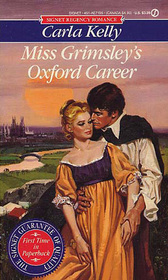Helpful Score: 1
Think of the Bennett family of PRIDE AND PREJUDICE; the Grimsley family of this book could be first cousins. Only children Ellen and Ralph Grimsley have any sense; the rest of the family members are empty-headed and silly. As the story opens, Ellen's elder sister Honoria is preparing to marry the unintelligent son of a pompous baronet.
Older brother, Gordon is drinking and gambling his time away in college. Ellen is horrified that he does not appreciate his opportunity to study at Oxford. What Gordon wants to do is buy a commission in the army; he is doing poorly in school.
Ellen has been slated to marry a local farmer who happens to have a couple of pieces of farmland that Squire Grimsley covets. Although Thomas Cornwell shares no interest in books with Ellen (or anything else), her father has traded her for the land he wants.
Fortunately for Ellen, her aunt gets involved and Ellen gets a term at Oxford. This is before women were allowed to study in British universities. Near Oxford, Ellen meets a rumpled scholar named James Gatewood.
She is sent to a finishing type school near Oxford. There she doesn't study Shakespeare and geometry; it is a smattering of French and needlework that occupy Ellen's time. Ellen is so disappointed! Relief comes from a strange place her brother Gordon. He's so lost that he's been paying other students to write his papers. He's out of money and begs Ellen to write his next paper.
After much wheedling and begging, Ellen writes a masterful essay on Shakespeare. First year students are required to offer public readings on Saturdays. After reading the paper, Gordon earns many accolades. Now he's been told to write another ... and another.
Ellen soon becomes angry that Gordon receives the recognition due her. A famous Lord Chesney hears the papers and collects each of them, leaving Ellen with no record of her work. She is not doing well at the finishing school because of her outspokenness. After Ellen is caught in an indiscretion at the ladies' school, Squire Grimsley collects Ellen and takes her home.
At first, this seems to be a light-hearted look at British life in the early 1800's. However, the author seems to be studying the difference between a youngster's dreams of what could be and making life choices related to what is possible.
Older brother, Gordon is drinking and gambling his time away in college. Ellen is horrified that he does not appreciate his opportunity to study at Oxford. What Gordon wants to do is buy a commission in the army; he is doing poorly in school.
Ellen has been slated to marry a local farmer who happens to have a couple of pieces of farmland that Squire Grimsley covets. Although Thomas Cornwell shares no interest in books with Ellen (or anything else), her father has traded her for the land he wants.
Fortunately for Ellen, her aunt gets involved and Ellen gets a term at Oxford. This is before women were allowed to study in British universities. Near Oxford, Ellen meets a rumpled scholar named James Gatewood.
She is sent to a finishing type school near Oxford. There she doesn't study Shakespeare and geometry; it is a smattering of French and needlework that occupy Ellen's time. Ellen is so disappointed! Relief comes from a strange place her brother Gordon. He's so lost that he's been paying other students to write his papers. He's out of money and begs Ellen to write his next paper.
After much wheedling and begging, Ellen writes a masterful essay on Shakespeare. First year students are required to offer public readings on Saturdays. After reading the paper, Gordon earns many accolades. Now he's been told to write another ... and another.
Ellen soon becomes angry that Gordon receives the recognition due her. A famous Lord Chesney hears the papers and collects each of them, leaving Ellen with no record of her work. She is not doing well at the finishing school because of her outspokenness. After Ellen is caught in an indiscretion at the ladies' school, Squire Grimsley collects Ellen and takes her home.
At first, this seems to be a light-hearted look at British life in the early 1800's. However, the author seems to be studying the difference between a youngster's dreams of what could be and making life choices related to what is possible.





